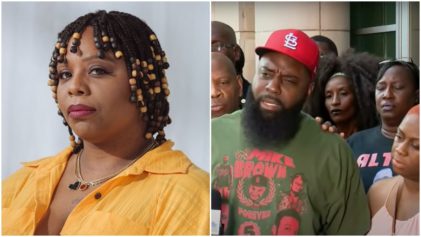In the midst of protests emerging all across the U.S. in support of slain teenager Michael Brown, officials and protesters are now speaking out from overseas and making it clear that frustration at the events in Ferguson, Missouri are being felt across the globe.
It was on November 24 that the grand jury’s decision not to indict Ferguson police officer Darren Wilson for the fatal shooting of the unarmed 18-year-old African-American was announced to the public.
Protests almost immediately sparked in cities all across the U.S., including Atlanta, St. Louis, New York City and Los Angeles but little did these protesters know that other countries were mobilizing as well and standing in solidarity with the people of Ferguson.
In London, protesters took to the streets chanting, “Hands up, don’t shoot!” and “No justice, no peace. Stop the racist police,” CNN reported.
Reports revealed that protestors gathered outside the U.S. Embassy in Grosvenor Square to let the people of Ferguson know that the pain they feel is being felt all across the world.
“We feel the pain, we know the pain of losing somebody at the hands of police,” Carole Duggan, whose nephew was fatally shot by police in north London roughly three years ago, told CNN. “We stand in solidarity with the people of Ferguson.”
For Duggan, Ferguson is so important because it has shed a light on issues that are not exclusive to that one community.
“What happens there will eventually happen here: If they can murder Michael the way they did, they can murder anyone’s mother, father, brother, sister, daughter or son,” Duggan said to the crowd of roughly 1,500 protestors.
Several of the protesters had their own stories of racial discrimination, whether it was against themselves or a loved one.
Their message for the public was that institutional racism is a problem that the entire world is facing—not just one city and not just one country.
For some, the results of that institutional racism can be described as nothing less than torture.
The U.N. Committee against Torture is pushing the U.S. to take a closer look at cases of police brutality, especially the frequent shootings of unarmed Black men, Reuters reported.
This will mark the panel’s first review of the U.S.’s record on preventing torture in roughly eight years.
The panel’s own investigation of the “frequent and recurrent police shootings or fatal pursuits of unarmed Black individuals” led them to push for the U.S. to have independent investigators involved with instances of police brutality.
“We recommend that all instances of police brutality and excessive use of force by law enforcement officers are investigated promptly, effectively and impartially by an independent mechanism,” panel member Alessio Bruni said, according to Reuters.
Another panel member told a group of reporters that there were concerns about how investigations of police brutality were being carried out in the U.S.

North Korean officials have also taken noticed of the frequent killings of unarmed Black men in America and claim that the U.S. no longer has the right to criticize their own issues with human rights.
“The occurrence of nationwide protests at present goes to prove that the U.S. human rights regime is beset with serious problems,” an anonymous ministry spokesperson said, according to the Korean Central News Agency (KCNA).
The report went on to say that the anonymous spokesperson slammed President Barack Obama for making “irresponsible remarks” following the announcement of the grand jury decision.
The president told the press that the country needs to remember that laws are put in place to keep order and that the people need to accept and respect the grand jury’s decision.
Meanwhile, North Korea is facing its own serious issues with human rights abuse.
According to HRW.org, which monitors issues of human rights all across the globe, “There has been no discernible improvement in human rights in the Democratic People’s Republic of Korea since Kim Jong-Un assumed power after his fathers death in 2011. The government continues to impose totalitarian rule.”



